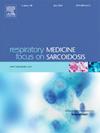Efficacy and determinants of response to inhaled treprostinil in pulmonary hypertension - interstitial lung disease
IF 3.5
3区 医学
Q2 CARDIAC & CARDIOVASCULAR SYSTEMS
引用次数: 0
Abstract
Inhaled treprostinil has shown to improve exercise capacity in patients with pulmonary hypertension-interstitial lung disease (PH-ILD). We evaluated the efficacy and determinants of favorable response to inhaled treprostinil at six months.
Methods
Of the 106 patients screened, 42 were eligible for this retrospective single-center study. Assessments included rate of patients who achieved ≥30m improvement on 6-min walk test (6MWT), and death or transplantation rates at 6 months of treatment initiation.
Results
Patients were predominantly female (n = 26, 62 %) with autoimmune PH-ILD (n = 23, 55 %), and a median age of 68 (61, 75) years. Ten (38.5 %) patients achieved a distance increase ≥30 m in 6MWT. No statistically significant determinants of walking ≥30 m were noted on univariate analysis; however, responders had a lower right ventricular (RV) tissue Doppler S' velocity (9.2 [7.0, 11.0] vs. 11.9 [10.0, 14.4], p = 0.018) cm/s and evidence of pericardial effusion on baseline echocardiogram (82 % vs. 26 %, p = 0.003). PH-ILD patients who died or underwent transplantation were more likely to have progressive pulmonary fibrosis (PPF) (95 % vs 50 %, p < 0.001)
Conclusions
In real-world setting, treatment with inhaled treprostinil for six months increased the 6MWT by ≥ 30 m in about a third of PH-ILD patients. Lower RV tissue Doppler S' velocity and presence of pericardial effusion at baseline were associated with favorable response to inhaled treprostinil. PPF portends a poor survival in PH-ILD.
肺动脉高压-间质性肺病吸入曲普瑞司替尼的疗效和决定因素
吸入曲普瑞替尼可改善肺动脉高压间质性肺疾病(PH-ILD)患者的运动能力。我们评估了吸入曲普瑞司替尼 6 个月后的疗效和良好反应的决定因素 方法:在筛选出的 106 名患者中,有 42 人符合这项回顾性单中心研究的条件。评估内容包括六分钟步行测试(6MWT)改善≥30米的患者比例,以及治疗开始后6个月的死亡率或移植率 结果:患者主要为女性(26人,62%),患有自身免疫性PH-ILD(23人,55%),中位年龄为68(61,75)岁。10名患者(38.5%)在6MWT中的距离增加≥30米。单变量分析显示,步行距离≥30 米的决定因素无统计学意义;但是,应答者的右心室(RV)组织多普勒 S'速度较低(9.2 [7.0, 11.0] vs. 11.9 [10.0, 14.4], p=0.018)cm/s,基线超声心动图显示有心包积液(82% vs. 26%, p=0.003)。死亡或接受移植的 PH-ILD 患者更有可能出现进行性肺纤维化 (PPF)(95% 对 50%,P=0.018)。
本文章由计算机程序翻译,如有差异,请以英文原文为准。
求助全文
约1分钟内获得全文
求助全文
来源期刊

Respiratory medicine
医学-呼吸系统
CiteScore
7.50
自引率
0.00%
发文量
199
审稿时长
38 days
期刊介绍:
Respiratory Medicine is an internationally-renowned journal devoted to the rapid publication of clinically-relevant respiratory medicine research. It combines cutting-edge original research with state-of-the-art reviews dealing with all aspects of respiratory diseases and therapeutic interventions. Topics include adult and paediatric medicine, epidemiology, immunology and cell biology, physiology, occupational disorders, and the role of allergens and pollutants.
Respiratory Medicine is increasingly the journal of choice for publication of phased trial work, commenting on effectiveness, dosage and methods of action.
 求助内容:
求助内容: 应助结果提醒方式:
应助结果提醒方式:


